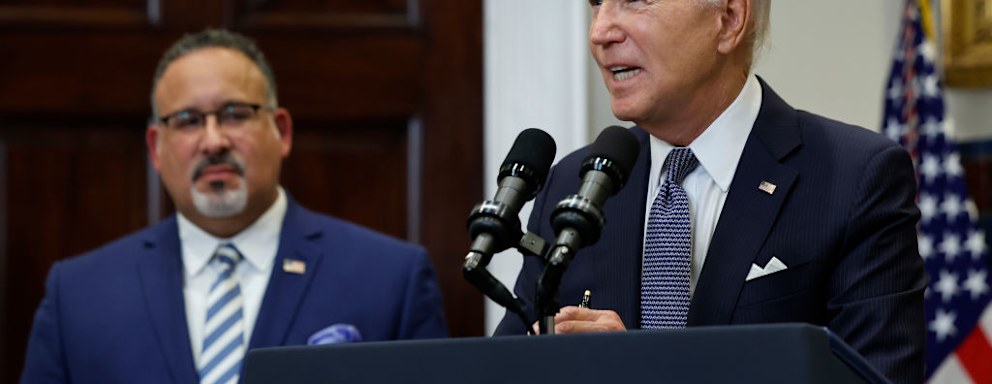Biden Administration Delays Title IX Rule Changes Again, Now Expected March 2024
 Credit: Chip Somodevilla / Getty Images
Credit: Chip Somodevilla / Getty Images- The Department of Education was expected to finalize the new Title IX rules in October.
- Now, the release date has been pushed back to March 2024.
- This is the second time the department has delayed the final rules.
- Lawmakers and sexual assault survivor advocacy groups are concerned about the delay, which enables Trump-era Title IX regulations to remain in effect.
The Biden administration has pushed back the release of new Title IX rules — again.
The finalized Title IX regulations were expected by the end of May last year but were pushed back to October. Now, according to the Department of Education’s Agency Rule List, the rules won’t be updated until March 2024.
The proposed rules would formally protect LGBTQ+ students for the first time. They would likewise replace Trump administration rules covering sexual misconduct and establish new requirements for how colleges and universities address Title IX complaints.
President Joe Biden’s proposed Title IX changes that would allow transgender college athletes to participate on sports teams that match their gender identity are also delayed. They are expected to be released in the same month. The administration’s proposed changes, however, would give colleges and universities the say in whether they can ban all athletes from participating in sports inconsistent with their assigned gender at birth.
Lawmakers and sexual assault survivor advocacy groups have been pushing the Biden administration to release new Title IX guidelines.
On Nov. 30, House Democrats wrote to Education Secretary Miguel Cardona asking for an updated timeline, emphasizing their worry about the Trump-era rules that remain in place.
“It is our understanding that these proposed rules were scheduled to be finalized last month, and we are concerned about the delay,” the letter read. “For years, students across the country have lived under former President Donald Trump’s Title IX policies that weakened protections for sexual assault and harassment survivors …”
Previously, under the Obama administration, Title IX rules had required colleges to investigate Title IX complaints within 60 days. Survivors who dropped out or transferred could still file a complaint, and schools could find respondents guilty if the evidence showed they were more likely guilty than not.
The Trump administration rolled back many of these provisions.
Critics of the current Title IX rules believe that the existing rules expand the rights of the accused and minimize the accuser’s rights.
Tanaya Kollipara, the student engagement organizer for Know Your IX, a survivor and youth-led program from Advocates for Youth, previously told BestColleges that the longer the current rules remain in effect, the more they hurt survivors on college campuses.
“It cannot be overstated how much student survivors on college campuses need these Title IX rule changes,” she said. “That’s how we ensure fair grievance processes and guarantee … the safe space that a college campus is supposed to stay that way and [is] not further interrupted by the impacts of sexual violence.”